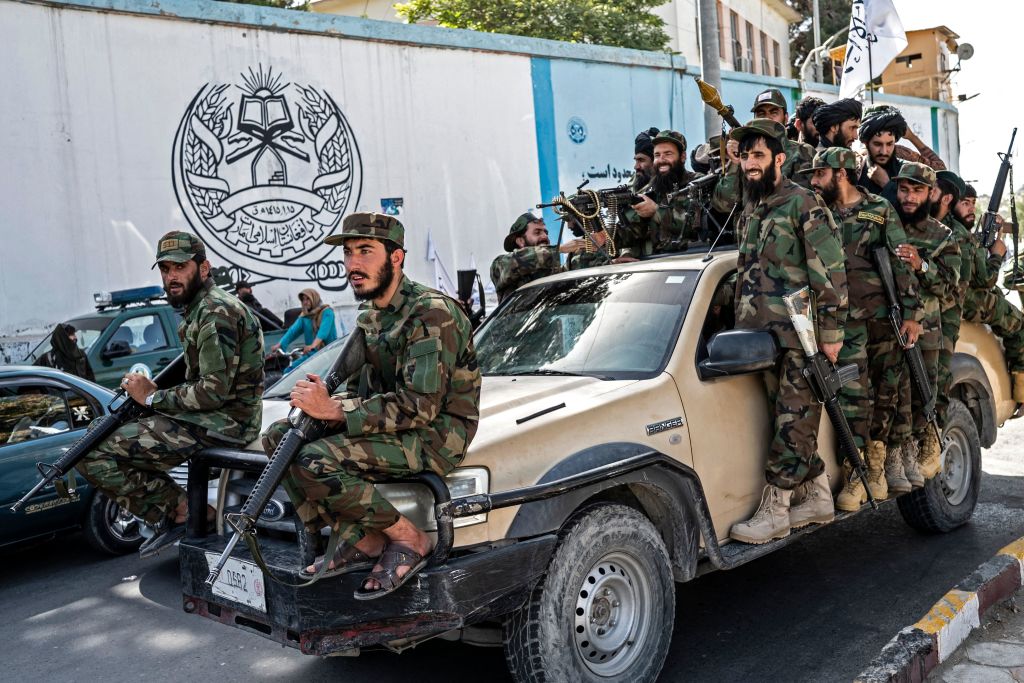DUSHANBE, Tajikistan—On August 31, 2021, President Joe Biden took to a podium at the White House to announce the end of a war. “Last night in Kabul, the United States ended 20 years of war in Afghanistan—the longest war in American history,” he said. Even as the Taliban celebrated the conquest of the country, Biden claimed victory. “We completed one of the biggest airlifts in history, with more than 120,000 people evacuated to safety. That number is more than double what most experts thought were possible. No nation—no nation has ever done anything like it in all of history,” he said, never mind the 1940 evacuation by sea of troops from the beaches of Dunkirk rescued nearly three times as many people, and the 1948-49 airlift to outlast the Berlin Blockade at its peak involved an airliner landing every 45 seconds.
That was far from the only thing he was wrong or dishonest about. Biden blamed his predecessor, Donald Trump, for saddling him with a flawed withdrawal agreement, but Biden relied on the same adviser as Donald Trump or, for that matter, George W. Bush. For more than 30 years, Zalmay Khalilzad, as special envoy, ambassador, advisor, lobbyist, has been central to the crafting of U.S. policy in Afghanistan, often in ways that undermine freedom.
In Biden’s speech, the president laid blame for the Taliban’s success on an unwillingness of the Afghan forces the United States and NATO trained to fight. “The assumption was that more than 300,000 Afghan National Security Forces that we had trained over the past two decades and equipped would be a strong adversary in their civil wars with the Taliban,” he explained. “That assumption—that the Afghan government would be able to hold on for a period of time beyond military drawdown—turned out not to be accurate.”
Biden was dishonest on both counts. Shortly after the withdrawal, Secretary of State Antony Blinken rebuffed criticism in the Senate that more than $7 billion in U.S. military equipment falling into Taliban hands would be a strategic liability. “Much of that equipment was made inoperable. Other pieces of equipment will become inoperable because there is no ability on the part of the Taliban to maintain it,” he explained. American contractors performed much of that maintenance, and both Trump and Biden withdrew them, also handicapping the Afghans the United States trained. Put another way, while criticizing the elected Afghan government for its failure to fight the Taliban, the United States was undermining Afghan forces by removing the people necessary to maintain the platforms around which the U.S. had built and trained the Afghan National Security Forces. The U.S. withdrawal also deprived the Afghan army of its air cover and support.
Even so, the Afghan army did not refuse to fight. In his postmortem to Afghanistan’s collapse, Sami Sadat, the Afghanistan army’s commanding general, noted, “We lost 66,000 troops over the past 20 years; that’s one-fifth of our estimated fighting force.” That tens of thousands of Afghan soldiers lost their lives over the years was testament to the falsehood of Biden’s claims. With fewer than 5,000 American troops, largely providing intelligence and support functions, the Afghan army kept the Taliban insurgency at bay, protecting not only Kabul but also every single Afghan provincial capital, no matter how remote. That the Afghanistan government did so as first the Trump and then the Biden administrations actively undermined them further highlighted their heroism and patriotism. Momentum matters. During both the 1990s and then the 2020s, the Taliban prefer to cut deals as their adversaries’ momentum wanes. This is why the repeated bashing if not abandonment of the Afghan government was so counterproductive. That said, the sheer number of funerals for Taliban fighters and their Pakistani advisors highlights the ferocity of the final fight in many areas. Simply put, Afghans did put their lives on the line for freedom, and many continue to do so even two years later.
The decision to undermine the Afghanistan government was mendacious. Presidents Bush, Trump, and Biden each turned to Khalilzad as their point man on Afghanistan because they believed he could provide insight as a native informant. He was born in Afghanistan and fluent in its official languages, but a naturalized American holding top security clearances. They believed Khalilzad would be neutral in his analysis, and objective in his agenda.
The problem was Khalilzad had never fully left his Afghan agendas behind. First, he was a lifelong rival of Ashraf Ghani, Afghanistan’s president at the time of the 2021 collapse. Less than two years apart in age, their rivalry developed first as pupils in Afghanistan, then as exchange students in the United States, and next as college students at American University of Beirut. The rivalry continued as both rose through the political ranks, Khalilzad as a functionary in Republican national security circles in the United States and, after his 2001 return, Ghani in Afghanistan. The tension between the two was palpable. Khalilzad twice considered running for president of Afghanistan himself, according to a top Ghani aide. The egos of both men seldom permitted deference to the other.
Second, Khalilzad had a mixed agenda. Prior to the September 11, 2001, attacks, he had lobbied on behalf of the Taliban, introducing representatives of the group around the United States and seeking to broker an oil pipeline deal. At the time, the Taliban was hosting al-Qaeda’s top leaders. As frustration grew in Washington, Khalilzad’s efforts helped keep the Taliban off the State Department terror sponsorship list.
As successive administrations put Khalilzad in charge of a peace plan, the combination of Khalilzad’s ambition, his past engagement with the Taliban, and his animus toward Ghani morphed into a strategy that gratuitously undermined his personal rival.
While Khalilzad demanded a peace in which a broad-based, inclusive government would take over Afghanistan, in practice he undercut that prospect by cutting the government out of negotiations with the Taliban. The deal gave the Taliban exactly what it wanted, diminishing the government’s legitimacy and playing into the Taliban’s own rejection of inclusion. Whether it was the American intention or not, the Taliban saw the exclusion of the Afghan government as an indication they could have absolute victory and need not compromise for a broader deal. The willingness by Washington to ignore Taliban pledges that the Taliban stop sheltering al-Qaeda or supporting terror further convinced the Taliban leadership that the United States was exhausted and would not hold the Taliban to uphold any agreements they made.
Rationalization among American diplomats, explained in background phone calls and roundtables with American analysts, that the end-run around the Kabul government was necessary because the Afghan government was corrupt was mistaken on two counts: First, the Afghan government was not a monolith. There was bad, but there was also vast good that Trump and Biden both abandoned, including a generation of bureaucrats—men and women—who embraced the concept of an Afghan nation where patriotism trumped gender segregation, tribal affiliation, or ethnic hatred.
While Taliban propaganda suggested the group represented purity while the elected Afghanistan government represented corruption, two facts belie such propaganda. First, Afghans have a longer institutional memory than Americans do. Taliban leaders had sought to depict themselves as pious and immune to corruption while they held power between 1996 and 2001. When I visited the Taliban’s “Islamic Emirate” in March 2000, Afghans told me they had welcomed the Taliban only to discover they were as corrupt as the warlords who preceded them.
Too many American officials appear to have convinced themselves that the Taliban were an authentic movement, representative of Pashtun culture. American perception of history is often measured in years rather than decades let alone centuries and so diplomats and analysts are prone to see Afghanistan 2001 or 2021 as the baseline rather than outlier. In reality, Afghans have explained during my visits to Afghanistan over the course of 27 years, Pakistan’s Inter-Services Intelligence (ISI) agency cultivated the Taliban to subsume Pashtun identity and make it more cooperative with Pakistan’s Islamist goals.
The idea that the Taliban, even 30 years after its founding, has any authenticity in Afghanistan is false. A major reason the Taliban refused to contest elections was because polls would expose the movement’s lack of popular support. In addition, the demand for Afghanistan to be an emirate rather than simply an Islamic republic belied any notion the Taliban could be part of a broad-based coalition with other Afghan parties. In a republic, the people hold the president accountable at the ballot box. But in an emirate, a self-selected group of religious leaders bestows legitimacy upon each other.
The Taliban waged an insurgency not because it wanted accountable governance or broader representation, but rather because it wanted to delegitimize the existing government. Trump, Biden, and Khalilzad played into its hands.
This makes the approach of the United States and international community toward the Taliban today even more bizarre. The United States releases on average $40 million each week to support humanitarian operations. Western diplomats say the Taliban does not benefit from such money because it often sits in private banks, utilized by international humanitarian groups. In practice, however, as with North Korea, such groups have no freedom of disbursement independent of the host regime, and are subject to its taxation and protection rackets. Afghan civil society leaders, religious leaders, former Afghan government officials, as well as European non-governmental organization staff and even U.N. officials who convened recently at the Herat Security Dialogue acknowledged the difficulty of operating independently in the country. The World Food Programme may fundraise off imminent starvation, however the problem is not lack of funds but rather the regime that keeps women at home and justifies the starvation of political enemies by deeming them complicit in the previous government or insufficiently Islamic.
While Biden administration officials conduct somersaults of logic to justify their subsidization of the Taliban, in reality there is no difference between recognizing and giving the Taliban aid and doing likewise with Hamas.
This also creates an irony: While the Taliban worked consistently to undermine the U.S.-backed elected government, today the U.S. works overtime to help the Taliban survive while Afghans seeking an inclusive, representative government are left out in the cold. If the goal is a broad-based political order in Afghanistan, a far better strategy would be to base Taliban recognition on the Taliban actually recognizing the legitimacy of other Afghans and political movements.
Compounding the strategic confusion is that the cash infusions Biden and Blinken now grant the Taliban keep the movement alive. Consider the Panjshir Valley, the last bastion of resistance before Afghanistan fell in 2021 and the ancestral home to Ahmad Shah Masoud, the mujahedeen commander most responsible for the defeat of the Soviet Union. (Al-Qaeda, acting on behalf of the Taliban, assassinated Masoud on September 9, 2001, two days before the devastating attacks on New York and Washington.)
Upon the collapse of Afghanistan in 2021, Taliban from across the country flooded the valley, including not only Pashtun Taliban, but also Tajik and Uzbek Taliban. Two years on, the Tajiks and Uzbeks have gone home. They have seen the reality of the Taliban, and have no interest in fighting; indeed, many are now sympathetic to Ahmad Masoud, Ahmad Shah Masoud’s son and the leader of the National Resistance Front that controls the mountains around Panjshir, if not the valleys. The only Taliban fighters who remain hail from Kandahar, Helmand, Zabul, and Uruzgan. Put another way, the Taliban’s Pakistani handlers have, as prior to 2001, managed to alienate the country. Gone is consensus, and in its place a greater reliance on brutality. This is the movement U.S. aid is helping to bolster.
Biden and Blinken may have botched Afghanistan policy, but they likely are sincere in a desire for Afghans to have a better future. Perhaps, then, it is time to take a two-track approach. Just as President Ronald Reagan appointed a black ambassador to apartheid-era South Africa and a Jewish ambassador to Pakistan, Blinken should utilize only women and religious minorities to engage with Afghanistan. The Taliban will not like it. They may even walk away. So be it. The $40 million a week should not be an entitlement.
Indeed. The second track of the policy would be to let them retreat. The best thing for Afghans of all ethnicities, sects, and sex would be for the Taliban to collapse. Let it. Then, rather than flood the country with aid and have agenda-driven envoys like Khalilzad to fiddle about as if he were a colonial commissar, step aside and let the Afghans rebuild their own country. Be there as a resource when needed, but do no harm. It is a lesson the United States should have learned 22 years ago, but it is not too late.






Please note that we at The Dispatch hold ourselves, our work, and our commenters to a higher standard than other places on the internet. We welcome comments that foster genuine debate or discussion—including comments critical of us or our work—but responses that include ad hominem attacks on fellow Dispatch members or are intended to stoke fear and anger may be moderated.
With your membership, you only have the ability to comment on The Morning Dispatch articles. Consider upgrading to join the conversation everywhere.